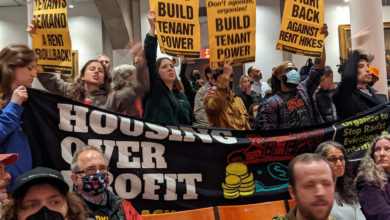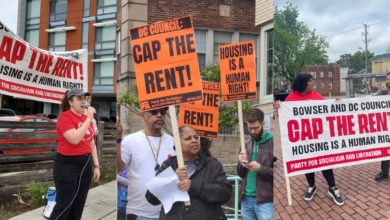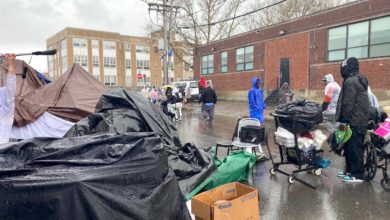On April 23, the City of Denver announced a mass sweep planned for April 30, covering a twelve block stretch in the historic Curtis Park neighborhood. Some 350 people shelter in tents in this area.
The city claimed the raid was necessary to “protect public health.” Activists say the timing is more likely linked to the city’s preparations for businesses to start reopening May 11.
Curtis Park and the nearby 5-Points and Whittier neighborhoods were once home to large Mexican and Black populations. It is historically working-class and poor, but in recent years, it has seen severe gentrification. Within these neighborhoods, brand-new luxury housing stands alongside some of the poorest blocks in the city. In some areas, property owners sit on parking lots or vacant land, undeveloped, while they rise in value with the rest of the Denver housing market. It is no wonder that there are multiple homeless encampments in these neighborhoods.
Homeless activists plan “We Deserve to Survive” Camp
The night before the planned sweep, a group of eight men who had been living in the targeted area decided to move to a long-unused vacant lot and set up a cooperative encampment called We Deserve to Survive Camp.
They erected their tents in compliance with social distancing guidelines and developed a schedule and division of labor to keep the area clean and safe and to do community outreach. An appointed leadership council was to “make decisions about pressing situations in the camp.” They wanted to set a model for using vacant lots for socially distanced camps that the city had no pretext to raid.
Denver Homeless Out Loud, a local homeless advocacy organization, was helping this camp and others to secure latrines and hand-washing stations for the site. DHOL organizers are both housed and unhoused, and they work tirelessly to secure and provide shelter and other essentials for the homeless in Denver.
The following morning, Denver police and city employees launched their raid on Curtis Park. Live video captured police and other city employees forcing people to pack up their belongings or have them confiscated or trashed. One man’s tent with all his belongings was picked up and thrown in a garbage truck; the city cited drug paraphernalia as the justification.
Denver officials finished clearing the camp on May 1. Then cops came to the “We Deserve to Survive” camp to tell them that they had five days to leave the lot or they would be removed with force. The cops returned again just hours later, telling the camp they had to vacate the premises immediately.
CDC guidelines say no sweeps
The city’s raid, supposedly motivated by concern for public health, directly contradicted the CDC’s guidelines on homeless sweeps during the COVID-19 pandemic.
The CDC explicitly advises that “[u]nless individual housing units are available, do not clear encampments during community spread of COVID-19. Clearing encampments can cause people to disperse throughout the community and break connections with service providers. This increases the potential for infectious disease spread.”
The city has not ensured that adequate individual housing units are available, despite pressure from unhoused people, advocates, and community members. PSL-Denver identified just ten apartment buildings with large numbers of vacancies that could immediately house 2,750 people — more than the entire Denver shelter system.
The CDC advises that if individual housing units are not available, encampments should be made as safe as possible by encouraging people to space tents and ensuring access to well-stocked bathrooms and hand-washing facilities 24 hours a day.
While the city has not been meeting these guidelines, this is exactly what the “We Deserve to Survive” camp was working to achieve. They asked, “If not here, where?” The city doesn’t have an answer.
Homelessness — a real crisis
Homeless advocacy organizations like Denver Homeless Out Loud say that there are close to 10,000 homeless in Denver, but the shelter system’s maximum capacity under normal conditions is 2,000 people. Many shelters have had to close down or reduce their capacity in the pandemic. The city’s makeshift relief shelters at the National Western Complex and the Denver Coliseum, packing 600 and 300 people under one roof, respectively, are not a solution.
Over 200 unhoused people in Denver have tested positive for the coronavirus and at least two have died. Testing for the homeless, along with healthcare generally, is criminally unavailable, and the number of infected is probably higher than reported. More people will lose their lives if the city doesn’t act to secure safe housing for those without it.
Absurdly, the crisis of homelessness in Denver, like everywhere in the country, is an artificial problem. There is no shortage of housing; there are more than 20,560 housing units sitting vacant in the city. The real problem is that in this society, private property is protected more highly than the essential needs of the people, even in a deadly pandemic.
The prevalence of homelessness will only grow as the current economic crisis deepens. We need real solutions — housing, not sweeps.






